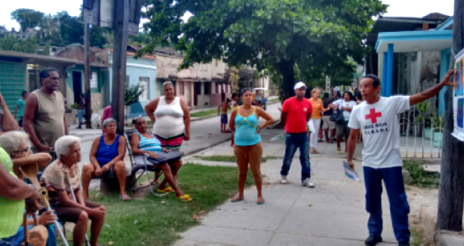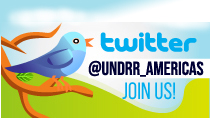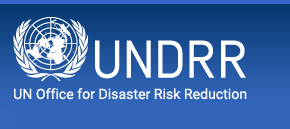- Our Mandate
- Mission and Objectives
- UNDRR in the UN
- Work Programme & Annual Reports
- Results Based System
- Work Partnerships
- Headquarters - Geneva
- SG-UN representatives for DRR
- Regional Office – The Americas and the Caribbean
- Head of the Regional Office – The Americas and the Caribbean
- What is Disaster Risk Reduction?
- What is the International Strategy?
- History of UNDRR
Disaster Preparedness programmes which are saving lives – the Experience of ECHO during Hurricane Matthew
 Red Cross Volunteers receive training in Cuba. PHOTO Cred: Red Cross Cuba
Red Cross Volunteers receive training in Cuba. PHOTO Cred: Red Cross Cuba
By: UNDRR
PANAMA CITY, Panama, January 25th 2017 – Projects that saved lives from the impact of Hurricane and disaster risk reduction programs in the region will be presented by the European Civil Protection and Humanitarian Aid Operations Department (ECHO) during the Regional Platform for Risk Reduction Disasters in the Americas (RP17), to be held in Canada in March where more than one thousand delegates from the countries and territories of the Americas are expected to participate.
While official figures indicate that Matthew, struck the Caribbean between September and October and claimed more than 500 human lives as well as 2.1 M people affected, the timely implementation of both disaster preparedness and response programs funded by ECHO in Caribbean countries were key in early action and in protecting the lives and livelihoods of the most vulnerable during Hurricane Matthew, just like they were in 2012 when they were implemented to mitigate the impact of Hurricane Sandy, which constitutes as an indicator of success in the humanitarian assistance work undertaken by ECHO in the Caribbean since 1994.
In Cuba, during the weather forecast segment, reporters discussed new products that reflected the use of advanced technologies that allowed for timely evacuations. Meanwhile in Haiti, Community Intervention Teams were organized, which provided better preparedness and response during an emergency. Trainings on the management of risk maps as tools for effective evacuation in areas of greater danger based on The Methodological Guide for Urban Risks developed by UNDP in the framework of the DIPECHO (2010) project were also used by major to anticipate the impact and to organize the first step of the response.
Moreover, the Dominican Republic and Haiti implemented a bi-national communication protocol supported by Alliance for Solidarity (APS), integrating a response and alert team between neighboring areas. The Dominican Republic and Haiti also collaborated during Hurricane Sandy, by preparing emergency water supply point and by finding secured ways to transport safe water both in Haiti and the Dominican Republic. This has been used during Matthew, after the collapse of the water supply systems and proved to make the difference in the early stage of the emergency response.
It should be noted that in 2010, when a cholera outbreak affected Haiti and then the Dominican Republic, ECHO financed the IFRC's Cholera Control Project which included the pre-positioning of several water treatment plants and the training of specialized emergency water teams, which were activated and deployed in Haiti to assist the communities most affected by Hurricane Matthew in 2016.
Also, in the Dominican Republic, removable shelter made available through previous disaster risk reduction action were used, where Community Network for Prevention, Mitigation and Response supported preventive evacuations through early warning systems and joint management in shelters.
Similarly, in St. Vincent and the Grenadines, in the context of the Early Warning System (EWS), the analysis of rainfall and river water levels facilitated strategic decision making to both inform the population of potential threats and to ensure effective coordination in the response at the national level.
For Ricardo Mena, Chief of the Regional Office for the Americas, of the United Nations Office for Disaster Risk Reduction (UNDRR), these good practices are an important indicator of success, since they were created, implemented and evaluated in previous emergencies in the region.
By sharing these experiences with a regional audience such as the one that will meet in Montreal, ECHO seeks to set a precedent for the importance of reusing tools and giving continuity to successful experiences, to maximize the return on investment in disaster risk reduction programs, which may well be permanent and institutionalized at national and local levels.
Evidence and effectiveness of ECHO-funded disaster preparedness and response best practices in Caribbean countries such as Cuba, Haiti, Dominican Republic and St. Vincent and the Grenadines will be presented by ECHO representatives at the Ignite Stage of the Fifth Session of the Regional Platform for Disaster Risk Reduction in the Americas (PR17), to be held in Montreal, Canada, from 7 to 9 March 2017.
For details of these practices, as well as exact dates and times of presentation, we invite you to consult the following links.
Related links:
Evidences on usefulness of past DRR actions funded by ECHO
Follow the UNDRR news online:
 Now we have twitter account @UNDRR Américas y el Caribe
Now we have twitter account @UNDRR Américas y el Caribe
JOIN US!
Tweets por el @UNDRR Américas y el Caribe
